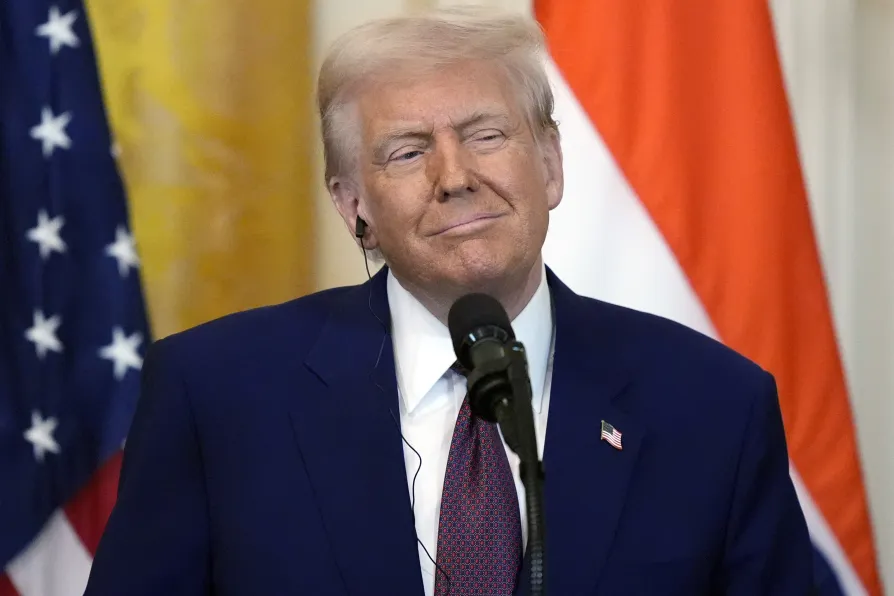
 President Donald Trump listens during a news conference with India's Prime Minister Narendra Modi in the East Room of the White House, February 13, 2025, in Washington
President Donald Trump listens during a news conference with India's Prime Minister Narendra Modi in the East Room of the White House, February 13, 2025, in Washington
DONALD TRUMP’S bullying trade policies are a humiliation for countries that consider themselves US allies — and make a powerful case for ending the so-called “special relationship.”
The United States has always used its economic clout to interfere in other countries’ politics. From the 1947 “exclusion crises” when the French and Italian coalition governments were instructed to expel their communist partners, through “making the economy scream” to undermine Salvador Allende’s government in Chile and most dramatically in the six-decade-plus crippling blockade of Cuba, it has weaponised aid and trade, often illegally.
But Trump’s tariff drive is novel in two respects.
He is unusually explicit in stating that trade favours are dependent on complying with his wishes on unrelated subjects.
The term “favours” is apposite, even though favourable treatment by Trump is relative. Trump receives foreign statesmen like an emperor granting audiences, and often not in official government settings, but at his private Mar-a-Lago palace or even — as with EU chief Ursula von der Leyen last weekend — at one of his golf clubs on vassal territory.
Slapping 35 per cent tariffs on Canada, White House aides were quick to brief that its PM Mark Carney was paying the price for saying he would recognise the state of Palestine. Even higher tariffs on Brazil have been tied to its refusal to drop prosecution of former president Jair Bolsonaro for plotting a military coup. The price of doing deals with Trump is, quite openly, surrendering your national sovereignty.
And while the US has before applied pressure to punish enemies or keep allies in line, Trump demands payment for the mere privilege of pretending to be his friend.
British ministers congratulate themselves on having avoided the latest tariffs through having struck a trade deal with Trump in spring.
But as Allan Beattie put it in the Financial Times, this deal was “closer to a protection payment to a mob boss than a liberalising agreement between sovereign countries.” The European Union’s golf-course surrender was even starker: a meek acceptance of hefty tariffs on EU exports while agreeing to drop all tariffs on US goods coming the other way.
China, which answered tariffs with tariffs and held its nerve, secured concessions from Trump that neither the EU nor Britain has managed. If the price of being in the US camp is that you get worse deals than those outside it, why stay?
The argument, glumly relayed from European capitals, is that the alternative is worse: access to the world’s biggest market is essential, and Washington can dictate terms. But this is short-sighted.
Trump’s tariffs frenzy is itself a reaction to the long-term decline of the US economy, especially compared with China’s. A rising global South is reshaping world economics. Why bend over backwards for the privilege of staying on a sinking ship, steered erratically by an abusive captain who doesn’t even stick to the agreements he’s signed?
For the left, this argument is compounded by the character of Trump’s demands. Taxes on tech giants and digital services have been dropped at Washington’s insistence. The policies Britain needs are incompatible with appeasing the White House.
Politics is in flux.
The huge Palestine movement has forced a breach with the US on recognising a Palestinian state. Hundreds of thousands have signed up to a new political initiative spearheaded by Jeremy Corbyn and Zarah Sultana, one which has the potential to put the arguments for peace and socialism back at the heart of the national discourse. And the advocates of a slavish transatlantic “alliance” — who still include the leaders of every big Westminster party — are daily humiliated by the patronising behaviour of a US president who is deeply unpopular in Britain.
It’s time we forced a real debate, challenging Britain’s place in the imperialist camp and demanding an independent foreign policy that welcomes rather than resists the emerging multipolar world.

US tariffs have had Von der Leyen bowing in submission, while comments from the former European Central Bank leader call for more European political integration and less individual state sovereignty. All this adds up to more pain and austerity ahead, argues NICK WRIGHT

FRANCISCO DOMINGUEZ says the US’s bullying conduct in what it considers its backyard is a bid to reassert imperial primacy over a rising China — but it faces huge resistance

It’s the dramatic rise of China with its burgeoning economy that has put the Trump administration into a frenzy – with major implications both at home and abroad, argues MICHAEL BURKE











